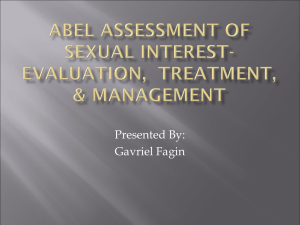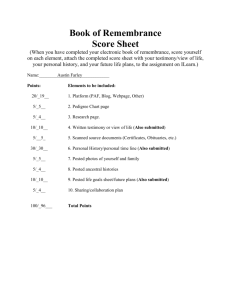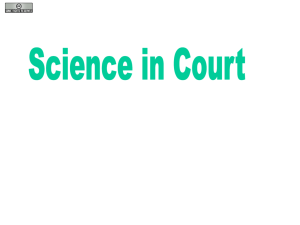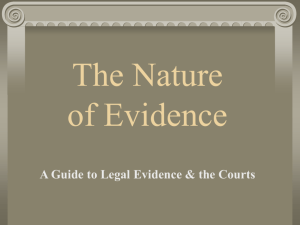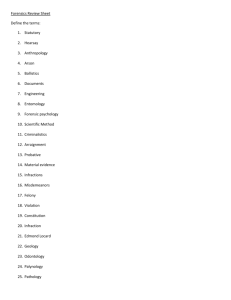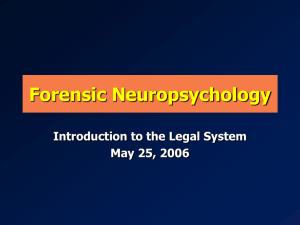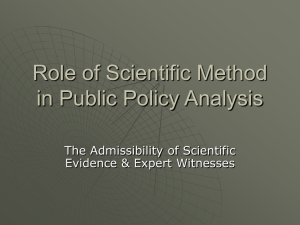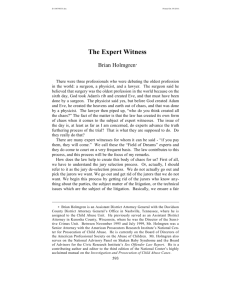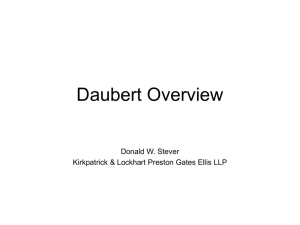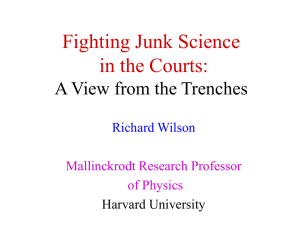DOCX - American University Washington College of Law
advertisement
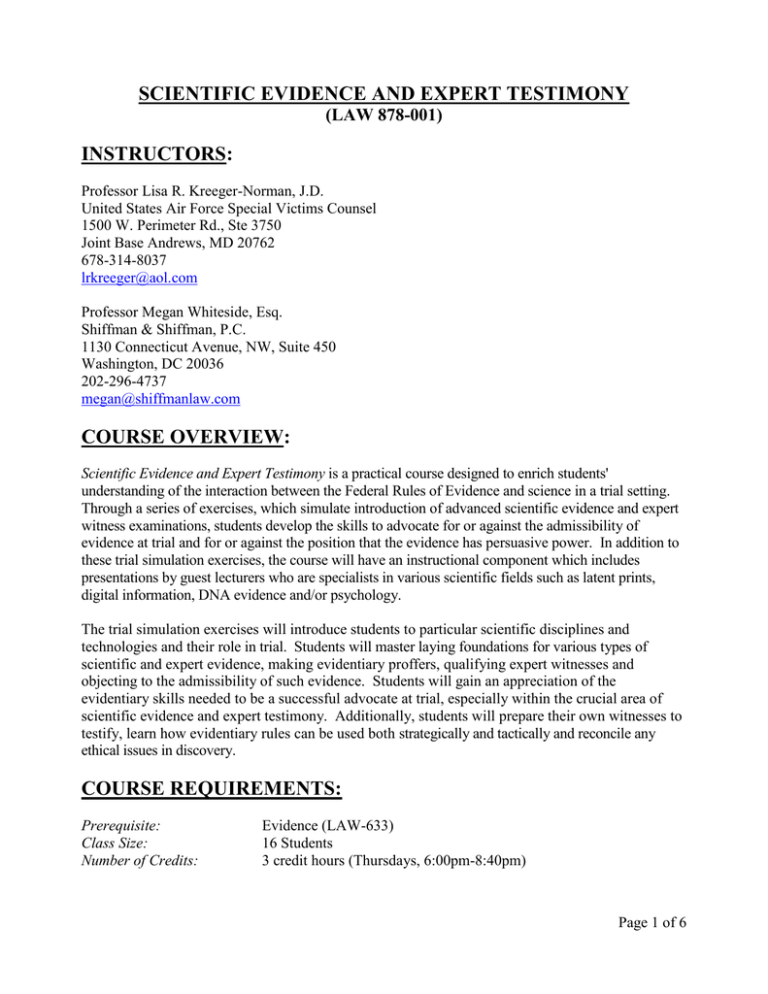
SCIENTIFIC EVIDENCE AND EXPERT TESTIMONY (LAW 878-001) INSTRUCTORS: Professor Lisa R. Kreeger-Norman, J.D. United States Air Force Special Victims Counsel 1500 W. Perimeter Rd., Ste 3750 Joint Base Andrews, MD 20762 678-314-8037 lrkreeger@aol.com Professor Megan Whiteside, Esq. Shiffman & Shiffman, P.C. 1130 Connecticut Avenue, NW, Suite 450 Washington, DC 20036 202-296-4737 megan@shiffmanlaw.com COURSE OVERVIEW: Scientific Evidence and Expert Testimony is a practical course designed to enrich students' understanding of the interaction between the Federal Rules of Evidence and science in a trial setting. Through a series of exercises, which simulate introduction of advanced scientific evidence and expert witness examinations, students develop the skills to advocate for or against the admissibility of evidence at trial and for or against the position that the evidence has persuasive power. In addition to these trial simulation exercises, the course will have an instructional component which includes presentations by guest lecturers who are specialists in various scientific fields such as latent prints, digital information, DNA evidence and/or psychology. The trial simulation exercises will introduce students to particular scientific disciplines and technologies and their role in trial. Students will master laying foundations for various types of scientific and expert evidence, making evidentiary proffers, qualifying expert witnesses and objecting to the admissibility of such evidence. Students will gain an appreciation of the evidentiary skills needed to be a successful advocate at trial, especially within the crucial area of scientific evidence and expert testimony. Additionally, students will prepare their own witnesses to testify, learn how evidentiary rules can be used both strategically and tactically and reconcile any ethical issues in discovery. COURSE REQUIREMENTS: Prerequisite: Class Size: Number of Credits: Evidence (LAW-633) 16 Students 3 credit hours (Thursdays, 6:00pm-8:40pm) Page 1 of 6 COURSE STRUCTURE AND EVALUATION: A substantial amount of out-of-class preparation is required for in-class exercises. Grading is based on the following: Class Participation, Oral Arguments, and Examinations Written Motions and Discovery Letter Final Exam 70% 15% 15% COURSE MATERIALS: All course materials will be provided electronically through MyWCL. SYLLABUS: Class 1, January 14: Introduction, Course Expectations, Nature and Purpose of Expert Opinion Evidence, Introduction to Forensic Science Required Reading Posted on MyWCL: Affidavit in Support of Arrest Warrant in United States v. Seth Tebow Lab Reports in United States v. Seth Tebow FRE 701-706 Subject Matter: Introduction, Class Outline, and Expectations Nature and Purpose of Expert Opinion Evidence U.S. v. Tebow Case Introduction Review of Case Affidavit and Lab Reports Class 2, January 21: Admissibility of Scientific Evidence, Persuasive Motions and Arguments, Explanation of Daubert Motions Exercise Required Reading Posted on MyWCL: Daubert v. Merrell Dow Pharmaceutical, 509 U.S. 579 (1993). General Electric Co v. Joiner, 522 U.S. 136 (1997). Kumho Tire v. Carmichael, et.al., 526 U.S. 137 (1999). In re Prime, 220 F. Supp 1203, (D.C. Wash, 2002). In re Prime, No. 02-30375, (9th Cir., April 16, 2004) Expert Testimony, Chapter 1, Part. D: Admissibility Subject Matter: How to Read a Lab Report Quality Controls in Forensic Science Admissibility of Scientific Evidence Page 2 of 6 Class 3, January 28: Forensic Discipline Under Scrutiny Required Reading Posted on MyWCL: Trial Motion Advocacy, Chapter 4: Persuasively Arguing a Motion or Response. Maryland v. Rose, Memorandum Decision. U.S. v. Llera Plaza I, 179 F. Supp.2d 492 (E.D. Pa. 2002). U.S. V Llera Plaza II 188 F.Supp.2d 549 (2002) D.H. Kaye, The NonScience of Fingerprinting: U.S. v Llera-Plaza, presented at the Association of American Law Schools Conference on Evidence, Washington D.C., 2002. Subject Matter: Persuasive Motions and Arguments Development and Transition of Latent Prints The Role of Probability Statements Guest Lecture Receive Assignment: Receive Assignment of Teams and Topics for Written Daubert Motions and Argument Class 4, February 4: Arguments on Motion to Admit or Exclude Evidence in Accordance with Daubert Required Reading Posted on MyWCL: Review Daubert Caselaw Subject matter: Moving to Exclude an Expert on Daubert Grounds Defending Against a Daubert Challenge to Your Expert Written Assignment Due at 12:00pm: Written Motion to Admit or Exclude Evidence Under Daubert Assignment Due: 1/2 of Class Presents Oral Argument on Daubert Motions Class 5, February 11: Remaining Arguments on Daubert Motions Required Reading Posted on MyWCL: Review Daubert Caselaw Subject matter: Moving to Exclude an Expert on Daubert Grounds Defending Against a Daubert Challenge to Your Expert Written Assignment Due at 12:00pm: Written Motion to Admit or Exclude Evidence Under Daubert Assignment Due: 1/2 of Class Presents Oral Argument on Daubert Motions Class 6, February 18: Constitutional Obligations Regarding Discovery Required Reading Posted on MyWCL: Brady v. Maryland, 373 U.S. 83 (1963). Page 3 of 6 Kyles v. Whitley, 514 U.S. 419 (1995). Federal Rule of Criminal Procedure 16 Ex Parte Coty, NO. WR-79,318-02, 180th District, Harris County (2014). In re Brown, 17 Cal.4th 873, 72 Cal.Rptr.2d 698; 952 P.2d 715 (1998). U.S. Department of Justice: A Review of the FBI’s Handling of the Brandon Mayfield Case Subject Matter: Constitutional Obligations Regarding Discovery Federal Rule of Criminal Procedure 16 Discussion Writing and Arguing Motions to Compel Discovery Receive Assignment: Receive Assignment of Teams and Topics for Motions to Compel Discovery Class 7, February 25: Arguments on Motion to Compel Required Reading Posted on MyWCL: Review Sample Motions to Compel Discovery Subject Matter: Oral Arguments on Motions to Compel Discovery Written Assignment Due at 12:00pm: Written Motion to Compel Discovery Assignment Due: Presentation of Oral Arguments on Motions to Compel Discovery Class 8, March 3: Qualifying and Laying a Proper Foundation for Expert Witness Testimony Required Reading Posted on MyWCL: Expert Testimony, Chapter 2: Finding Experts Expert Testimony, Chapter 3: Preparation Greg Norman CV Defense Expert CVs Subject Matter: Selecting Expert Witnesses Expert Interviews Expert Qualifications and Voir Dire Guest Lecture – Greg Norman Receive Assignment: Receive Assignment of Teams and Topics for Qualification and Voir Dire Exercise Class 9, March 10: Qualification and Voir Dire Presentations Subject Matter: Qualification and Voir Dire of Expert Witnesses at Trial Assignment Due: Presentation of Qualification and Voir Dire Examinations Page 4 of 6 (SPRING BREAK MARCH 17) Class 10, March 24: Melendez-Diaz, Substitution of Expert Witnesses, Depositions of Expert Witnesses in Civil Cases Required Reading Posted on MyWCL: Melendez-Diaz v Massachusettes, 557 U.S. 305 (2009) Bullcoming v New Mexico, 131 S.Ct. 2705 (2011) Williams v Illinois, 132 S.Ct. 2221 (2012) Teresa M. Garvey, Williams v Illinois and Forensic Evidence: The Bleeding Edge of Crawford, Strategies Newsletter, Aequitas, Washington DC 2013 Thomas C. Frongillo, Caroline K. Simons, Jaclyn Essinger, and Matthew Knowles, The Reinvigorated Confrontation Clause: A New Basis to Challenge the Admission of Evidence From Nontestifying Forensic Experts In White Collar Prosecutions, The Champion Newsletter, National Association of Criminal Defense Lawyers, Washington DC, 2013 Successful First Depositions, Chapter 6: Expert Depositions Subject Matter: Confrontation Clause and Expert Witnesses How to Conduct Depositions of Expert Witnesses Receive Written Assignment: Receive Assignment for Expert Witness Disclosure Letter Class 11, March 31: Issues Involving DNA and Latent Prints Required Reading Posted on MyWCL: Review Case File Materials – DNA and Latent Prints L. Kreeger; D. Weiss, Forensics DNA Fundamentals; Be Not Afraid, American Prosecutors Research Institute, Alexandria, VA, 2003 DNA Evidence: Basic of Analyzing, NIJ.Gov, National Institute of Justice, Types of Forensics, 2012 Effects of Human Factors on the Accuracy of Fingerprints, NIJ.Gov, National Institute of Justice, Types of Forensics, 2012 A Simplified Guide to Fingerprint Analysis, National Forensic Science and Technology Center, Largo, FL, 2009 Resume, DNA Expert Fredric Swartz Resume, Catherine McKee Subject Matter: Issues Involving Latent Prints and DNA Evidence Guest Lecture Written Assignment Due at 12:00pm: Expert Witness Disclosure Letter Page 5 of 6 Class 12, April 7: Direct and Cross Examination of Expert Witnesses Required Reading Posted on MyWCL: Expert Testimony, Chapter 5: Direct Examination Expert Testimony, Chapter 6: Cross Examination the Basics Expert Testimony, Chapter 7: Cross Examination What to Expect Expert Testimony, Chapter 8: Cross Examination: How to Cope Subject Matter: Guest Lecture How to Conduct Expert Witness Direct Examinations How to Conduct Expert Witness Cross Examinations Receive Assignment of Teams and Topics for Direct and Cross Examinations Class 13, April 14: Direct and Cross of Expert Witnesses Subject Matter: Expert Witness Direct and Cross Examinations Assignment Due: Presentation of Expert Direct and Cross Examinations Class 14, April 21: Direct and Cross of Expert Witnesses Subject Matter: Expert Witness Direct and Cross Examinations Assignment Due: Presentation of Expert Direct and Cross Examinations May 7: FINAL TRIAL Page 6 of 6
